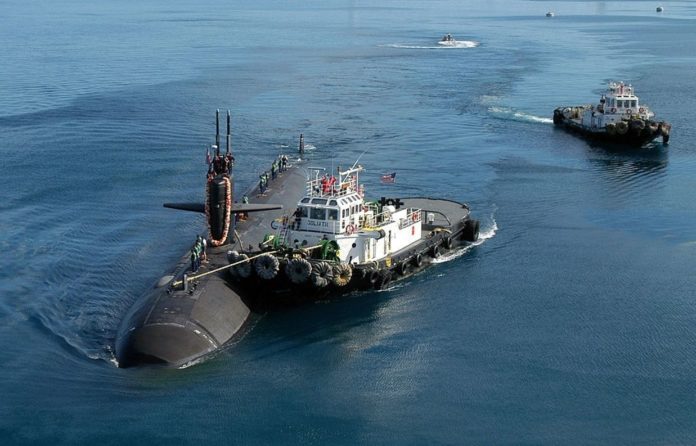According to experts, this is a decisive move for a country in the Asia-Pacific region.
The security agreement with the United States (and the United Kingdom) provides Australia with a significant defence upgrade from the world’s most powerful military.
However, this is a conditional gift. And there is debate over whether such a decision – made without public consultation – will be in the national interest of Australia.
China’s rise to power has prompted it to challenge the US’s hegemony in the Asia-Pacific region.
China has constructed the world’s largest navy and has grown increasingly assertive in disputed areas such as the South China Sea.
Australia had long maintained that it did not have to choose between the two superpowers, but its stance toward Beijing has hardened in recent years.
China has been accused of meddling in Australian politics and launching cyberattacks on critical institutions.
Tensions were heightened last year when Australia demanded an investigation into the coronavirus’s origins. Following that, a wave of Chinese sanctions against Australian exports ensued.
That was Australia’s “a-ha” moment, says John Blaxland, an international security professor at the Australian National University.
“What happened was the dawning realisation that all these things that had preceded weren’t benign,” he says. “We were talking about a country that had become surprisingly hostile.”
Australia recognized the urgent need to strengthen its defences.
Aukus is a significant coup for the country on that front. Australia will gain access to nuclear-powered submarines and long-range missiles developed by the United States under the terms of the pact.
This “super-enables an otherwise pedestrian middle-ranking military capability of little consequence beyond its border”, says Prof Blaxland.
In the event of conflict, Australia would also gain the ability to strike adversaries from afar for the first time.
“This is about giving the Australian Defence Force a capable edge in a region where the capability of our own defence force when matched against China is going backwards,” said Richard Maude, a former top Australian security official and now policy director at Asia Society Australia.
However, Washington views this “one-off” trade as critical to its broader efforts to contain China, experts say.
As China expands its naval presence in the region, Australia’s fleet – albeit small and far from completion – will act as a counterweight to roving US forces, they add.
“We’re trying to play catch-up by developing a credible deterrence to reduce prospects of war,” says Prof Blaxland.
“Because at the moment our deterrence is simply not credible. China can essentially act against us with a degree of impunity. That is becoming politically intolerable.”
According to critics, Australia has forfeited its strategic ambiguity and increased its vulnerability as a result of the pact.
“The way in which it was announced rips away any pretence that Australia was not firmly on the side of containing China militarily,” says Prof Allan Gyngell, president of the Australian Institute of International Affairs.
According to analysts, Australia will almost certainly face additional economic retaliation from its largest trading partner.
“The countries were a long way off returning to diplomatic normality and this only exacerbates that,” says Dr Lai-Ha Chan from the University of Technology, Sydney.
Others argue that Aukus also permanently binds Australia to the US.
Australia may struggle in the future to maintain autonomy over decisions that are in its best interests. It will be entirely dependent on imported nuclear technology.
“We can’t operate the submarines ourselves. So in effect we are ceding some of our sovereignty to the US, and maybe Britain,” Prof Gyngell says.
“It will become therefore impossible for the major strike capacity of the Australian navy to operate without a US veto.”
He adds that it also restores Australia’s status as a “smaller partner in the Anglosphere,” despite recent statements about relocating its focus to Asia.
“We’re hanging out again with the people we’re comfortable with, ditching efforts to build closer relations with others in our region,” Prof Gyngell says.
“That is a problem.”
Image Credit: Getty
